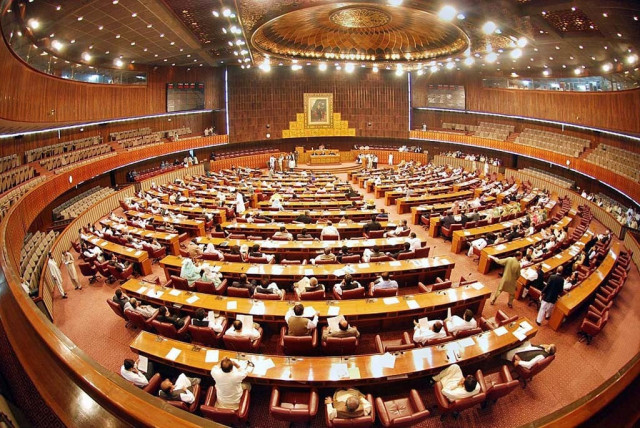New bill 'targets' online obscenity
Entails penalties ranging from Rs100,000 to Rs1 billion

Legislation on a new bill — Prohibition of Obscenity and Vulgarity on Digital Media Bill 2025 — is expected in the next National Assembly session. Introduced by PPP MNA Dr Syeda Shahida Rehmani, the bill seeks to curb obscene content online and entails penalties ranging from Rs100,000 to Rs100 million.
The proposed bill defines "digital media" and "prohibited content" as including online and offline platforms, applications, social media, and streaming services. It will apply to all content in the form of images, audio, videos, multimedia, films, web series, animated sketches, dramas, songs, short videos, live broadcasts, or advertisements viewable via digital media.
Prohibited content includes sexual conversations, extramarital relations, sexual immorality, semi-nude attire, drug use, violations of public morality, hurting religious sentiments, mocking hijab, purdah, or the family system, ridiculing religious figures, and violating the ideology of Pakistan or cultural values.
Under the bill, an authority, a board, and a tribunal will be established. Violations will be investigated by the National Cyber Crime Investigation Agency (NCCIA) and prosecuted under the Prevention of Electronic Crimes Act, 2016.
The board will have eight members: two religious scholars, one woman and one man, two psychologists, one female civil society member, one media legal expert, one media professional responsible for seizing prohibited content, and a federal government representative as chairperson.
The tribunal will consist of three members: a person qualified to be a high court judge, a media professional, and an IT expert, who will hear and decide cases related to digital media.
The board will have the authority to ban prohibited content, make amendments, take suo motu action against obscene material, and recommend fines for violations, while the authority will act on the board's recommendations.
Penalties under the bill include one-year imprisonment and a Rs500,000 fine for the first-time offense and three-year imprisonment and Rs5 million fine for the second offense. Offenses involving religion, women, children, or the family system will entail five-year imprisonment and Rs10 million fine.
Digital media platforms and service providers will be required to report all uploaded content in Pakistan to the board within 15 days and, upon notice, block prohibited content within 24 hours and retain the record for three years.
Rs50 million will be imposed on platforms for the first violation and Rs100 million fine for the second violation. Repeated violations will result in license cancellation and service blockage.
All crimes under this act will be non-bailable and non-compoundable. The bill is expected to be approved by the NA after deliberation in the relevant standing committee.
The PECA, a law enacted in 2016, was passed by lower and upper houses, aimed at addressing cybercrime and regulating electronic communication in Pakistan. It was meant to combat online offences such as hacking, data theft, and cyberbullying. Many journalists and media organisations have raised concerns regarding its implications on press freedom and freedom of expression.
"The government has to learn the lessons as it was earlier used against the same party, which had passed the law in a haste," commented Mazhar Abbas, a senior member of PFUJ.




















COMMENTS
Comments are moderated and generally will be posted if they are on-topic and not abusive.
For more information, please see our Comments FAQ